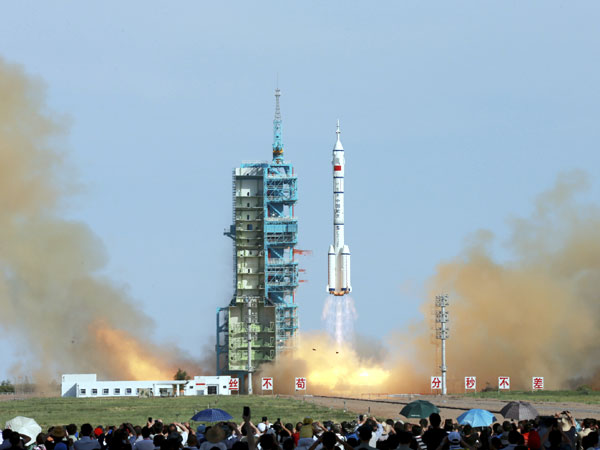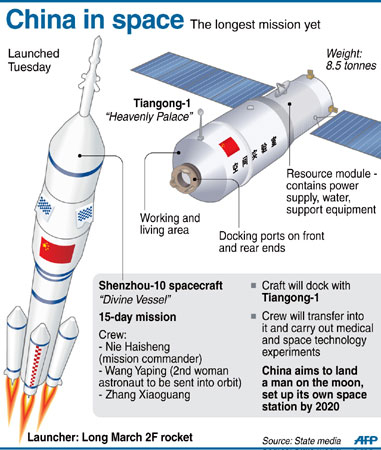China launches longest-ever manned space mission

In this photo released by China’s Xinhua news agency, the Long March-2F rocket carrying China’s manned Shenzhou-10 spacecraft blasts off from the launch pad at the Jiuquan Satellite Launch Center in Jiuquan, northwest China’s Gansu Province, Tuesday, June 11, 2013. China’s latest manned spacecraft blasted off on a 15-day mission to dock with a space lab. (AP
BEIJING — China Tuesday began its longest manned space mission with the launch of the Shenzhou-10 rocket, state television showed, as the country steps up an ambitious exploration program symbolizing its growing power.
The rocket ascended above the Jiuquan space center in the Gobi Desert trailing a vast column of flame.
The three astronauts on board — who include Wang Yaping, 33, China’s second woman in space — saluted cameras mounted inside their capsule and moments later the boosters detached from the rocket.
The crew are due to spend 15 days in orbit.
President Xi Jinping, fresh from a summit with US President Barack Obama, was on hand to watch the departure of the Shenzhou-10 — the name means “Divine Vessel” — exactly on time at 0938 GMT.
Beijing sees the multi-billion-dollar space program as a marker of its rising global stature and mounting technical expertise, as well as the ruling Communist Party’s success in turning around the fortunes of the once poverty-stricken nation.
The program is heavily promoted to the domestic audience, and state broadcaster CCTV began continuous coverage several hours before the launch.
Xi told the trio he had come to see them off on behalf of the Communist Party, the government, the military and “all the nationalities and people of the entire nation.”
“You make all the Chinese people feel proud. Your mission is both glorious and sacred”, he added.
Mission commander Nie Haisheng responded: “We will certainly obey orders, comply with commands, be steady and calm, work with utmost care and perfectly complete the Shenzhou-10 mission.”
The three crew, in white space suits, emerged from a building and greeted crowds of well-wishers waving flags and artificial flowers, some in traditional costumes, before boarding a bus for transfer to the launch pad.
State-run newspapers gave the mission blanket coverage, with stories and pictures of the astronauts on almost every front page.
Wang will teach lessons to schoolchildren via video link during the mission, officials said.
“We are all students in facing the vast universe. We are looking forward to joining our young friends to learn and explore the mystical and beautiful universe,” she told a press conference on Monday.
The official Xinhua news agency ran profiles of the three astronauts. It said Wang, who trained as a transport pilot in the air force, has 1,600 hours of flying experience including dispelling clouds for the opening ceremony of the Beijing Olympics in 2008.
She is a major in the military and a member of the Communist Party.
“The experience of doing farm work since an early age has made her strong, and the habit of long-distance running tempered her will,” Xinhua said.
It quoted her as saying that during parachute exercises in the air force: “We girls all cried while singing an inspiring song ‘A Hero Never Dies’ on our way back after the training.”
The third crew member, senior colonel Zhang Xiaoguang, has previously tried for selection for space missions but was not picked, Xinhua said.
“If success is part of our life, so are setbacks. If those who had never failed are winners, so are those who always keep on trying,” it quoted him as saying.
The Shenzhou-10 will dock with the Tiangong-1 — “Heavenly Palace” — space laboratory, and the crew will transfer into it and carry out medical and space technology experiments.
China first sent a human into space only in 2003 and its capabilities still lag behind the US and Russia. But its program is highly ambitious and includes plans to land a man on the moon and build a station orbiting earth by 2020.
At the same time the US, long the leader in the field, has scaled back some of its projects, such as retiring its space shuttle fleet.
Independent space analyst Morris Jones, who is based in Sydney, Australia, said: “I think the fact that they’re flying a very long and complex mission shows that China’s astronaut program has reached a full degree of maturity.
“They are very steadily laying the groundwork that they will need to build their own space station.”